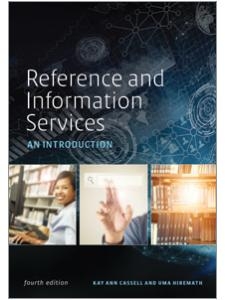Primary tabs
You don't need to be an ALA Member to purchase from the ALA Store, but you'll be asked to create an online account/profile during checkout to proceed. This Web Account is for both Members and non-Members. Note that your ALA Member discount will be applied at the final step of the checkout process.
If you are Tax-Exempt, please verify that your account is currently set up as exempt before placing your order, as our new fulfillment center will need current documentation. Learn how to verify here.
- Description
- Table of Contents
- About the authors
- Reviews
This book is available in e-book format for libraries and individuals through aggregators and other distributors—ask your current vendor or contact us for more information. Examination copies are available for instructors who are interested in adopting this title for course use.
Designed to complement every introductory library reference course, this is the perfect text for students and librarians looking to expand their personal reference knowledge, teaching failsafe methods for identifying important materials by matching specific types of questions to the best available sources, regardless of format. Guided by a national advisory board of educators and practitioners, this thoroughly updated text expertly keeps up with new technologies and practices while remaining grounded in the basics of reference work. Chapters on fundamental concepts, major reference sources, and special topics provide a solid foundation; the text also offers fresh insight on core issues, including
- ethics, readers' advisory, information literacy, and other key aspects of reference librarianship;
- selecting and evaluating reference materials, with strategies for keeping up to date;
- assessing and improving reference services;
- guidance on conducting reference interviews with a range of different library users, including children and young adults;
- a new discussion of reference as programming;
- important special reference topics such as Google search, 24/7 reference, and virtual reference; and
- delivering reference services across multiple platforms
As librarians experience a changing climate for all information services professionals, in this book Cassell and Hiremath provide the tools needed to manage the ebb and flow of changing reference services in today's libraries.
List of Figures and Tables
Preface
Acknowledgments
Part I Fundamental Concepts
1 Introduction to Reference and Information Services
2 Determining the Question: In-Person, Telephone, and Virtual Reference Interviews
3 Finding the Answer: Basic Search Techniques
Part II Introduction to Major Reference Sources
4 Answering Questions about Books, Magazines, Newspapers, Libraries and Publishing, and Bibliographic Networks—Bibliographic Resources
5 Answering Questions about Anything and Everything—Encyclopedias
6 Answering Questions That Require Handy Facts—Ready Reference Sources
7 Answering Questions about Words—Dictionaries, Concordances, and Manuals
8 Answering Questions about Events and Issues, Past and Present—Databases (and Indexes)
9 Answering Questions about Health, Law, and Business—Special Guidelines and Sources
10 Answering Questions about Geography, Countries, and Travel—Atlases, Gazetteers, Maps, Geographic Information Systems, and Travel Guides
11 Answering Questions about the Lives of People—Biographical Information Sources
12 Answering Questions about Government and Related Issues—Government Information Sources
Part III Special Topics in Reference and Information Work
13 When and How to Use the Internet as a Reference Tool
14 Readers’ Advisory Services
Cindy Orr
15 Reference Services for Children and Young Adults
Sujin Huggins
16 Information Literacy in the Reference Department
Part IV Developing and Managing Reference Collections and Services
17 Ethics in Reference
Diana Floegel
18 Selecting and Evaluating Reference Materials
19 Reference as Programming
20 Managing Reference Departments
21 Assessing and Improving Reference Services
22 Reference 2.0
23 The Future of Information Service
Appendix: RUSA Outstanding Reference Sources 2007–2017
Index of Reference Resources
Subject Index
About the Authors and Contributors
Kay Ann Cassell
Kay Ann Cassell is presently an adjunct professor at the Rutgers University Department of Library and Information Science where she teaches a variety of courses including reference and information services, collection development, public librarianship and government information resources. She has worked in public and academic libraries. She has been the director of several public libraries and was the Associate Director for Collections and Services at the New York Public Library. As NYPL’s Associate Director of Collections and Services she oversaw the development of reference, collections, programs and services for all of the branches and initiated new programs and services. She received her MLS from Rutgers University and her PhD from the International University for Graduate Studies. She is the author of Managing Reference Today and Public Libraries and Their Communities, and she was selected as the 2019 winner of the Isadore Gilbert Mudge Award, the Reference and User Services Association’s highest honor.
Uma Hiremath
Uma Hiremath is Assistant Director of Public Services at Stonehill College in Easton, Massachusetts. She was formerly Executive Director at the Ames Free Library, Massachusetts; Assistant Director at the Thayer Public Library, Massachusetts; Head of Reference at the West Orange Public Library, New Jersey; and Supervising Librarian at the New York Public Library. She received her MLS from Pratt Institute, New York and her PhD in political science at the University of Pittsburgh.
”Librarians and library educators will want to update their own copies and consider assigning them as textbooks to LIS students. Essential."
— ARBA
”Helpful figures illustrate the many types of resources and platforms reference librarians are likely to encounter. Throughout the authors emphasize assisting users and, more important, teaching them to become skilled and savvy researchers. Libraries of all kinds will find this text is worth adding to their shelves."
— CHOICE



